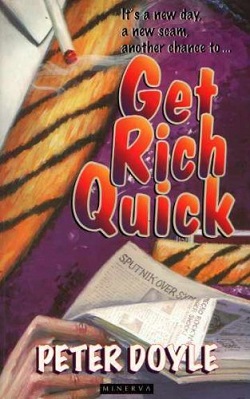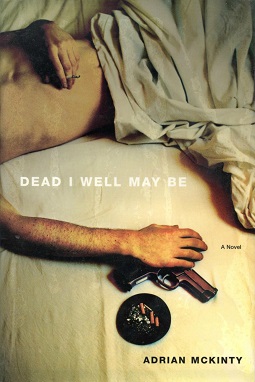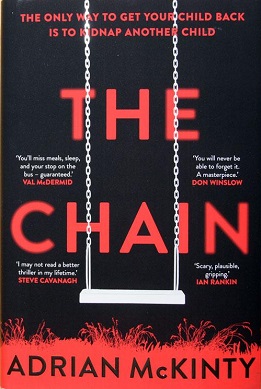
Free Derry was a self-declared autonomous Irish nationalist area of Derry, Northern Ireland that existed between 1969 and 1972 during the Troubles. It emerged during the Northern Ireland civil rights movement, which sought to end discrimination against the Irish Catholic/nationalist minority by the Protestant/unionist government. The civil rights movement highlighted the sectarianism and police brutality of the overwhelmingly Protestant police force, the Royal Ulster Constabulary (RUC).

The Glens of Antrim, known locally as simply The Glens, is a region of County Antrim, Northern Ireland. It comprises nine glens (valleys), that radiate from the Antrim Plateau to the coast. The Glens are an area of outstanding natural beauty and are a major tourist attraction in north Antrim.

Peter Temple was an Australian crime fiction writer, mainly known for his Jack Irish novel series. He won several awards for his writing, including the Gold Dagger in 2007, the first for an Australian. He was also an international magazine and newspaper journalist and editor.
Joe McCann was an Irish republican paramilitary. A member of the Irish Republican Army and later the Official Irish Republican Army, he was active in politics from the early 1960s and participated in the early years of the Troubles in Northern Ireland. He was shot dead during a confrontation with RUC Special Branch members and British paratroopers in 1972.
Garry Disher is an Australian author of crime fiction and children's literature. He is a three-time winner of the Ned Kelly Award for Best Novel.

Adrian McKinty is a Northern Irish writer of crime and mystery novels and young adult fiction, best known for his 2020 award-winning thriller, The Chain, and the Sean Duffy novels set in Northern Ireland during The Troubles. He is a winner of the Edgar Award, the Theakston Old Peculier Crime Novel of the Year Award, the Macavity Award, the Ned Kelly Award, the Barry Award, the Audie Award, the Anthony Award and the International Thriller Writers Award. He has been shortlisted for the CWA Ian Fleming Steel Dagger and the Grand Prix de Littérature Policière.
Sam McAughtry was an Irish / British writer, broadcaster and raconteur.
Barry Maitland is an Australian author of crime fiction. After studying architecture at Cambridge, Maitland practised and taught in the UK before moving to Australia, where he became a professor of architecture at the University of Newcastle. He retired in 2000 and took up writing full-time.

Get Rich Quick is a 1996 Ned Kelly Award-winning novel by the Australian author Peter Doyle.

James Gamble, is a British former police officer and head of Belfast region for the now disbanded RUC Special Branch.

The Barry Award is a crime literary prize awarded annually since 1997 by the editors of Deadly Pleasures, an American quarterly publication for crime fiction readers. From 2007 to 2009 the award was jointly presented with the publication Mystery News. The prize is named after Barry Gardner, an American critic.

Blackwattle Creek (2012) is a crime novel by Australian author Geoffrey McGeachin. It is the second in the author's Charlie Berlin mystery series and won the 2013 Ned Kelly Award.

The Rose & Crown Bar bombing was a bomb attack carried out against a Catholic-owned pub in Belfast. The attack was carried out by the loyalist paramilitary group the Ulster Volunteer Force (UVF) just less than two weeks before the start of the Ulster Workers' Council strike of May 1974 which brought down the Sunningdale power sharing agreement and just 15 days before the UVF carried out the Dublin and Monaghan bombings which killed 34 and injured 300 people, the highest casualty rate in a single day during The Troubles in either Ireland or Britain.

The Tall Man: Death and Life on Palm Island is a 2008 book by Chloe Hooper. It is about the events surrounding the death in custody of Aboriginal Australian man, Cameron Doomadgee. It won numerous awards and was shortlisted for many others in 2009.
Jane Harper is a British Australian author known for her crime novels, including The Dry, Force of Nature and The Lost Man, all set in rural Australia.

Dead I Well May be is a 2003 novel by Irish/Australian author Adrian McKinty. It is his second novel, following Orange Rhymes With Everything, and was nominated for the CWA Ian Fleming Steel Dagger award for the best thriller of the year. Booklist chose Dead I May Well Be to be included in its ten best crime novels of the year. The plot is often brutal and dark which McKinty describes vividly.
Dervla McTiernan is an Irish crime novelist.

The Chain is a 2019 novel written by Adrian McKinty.
Gerard Doyle is an English actor and audiobook narrator. He has won 1 Audie Award and 35 Earphone Awards. AudioFile named him a Golden Voice Narrator.












